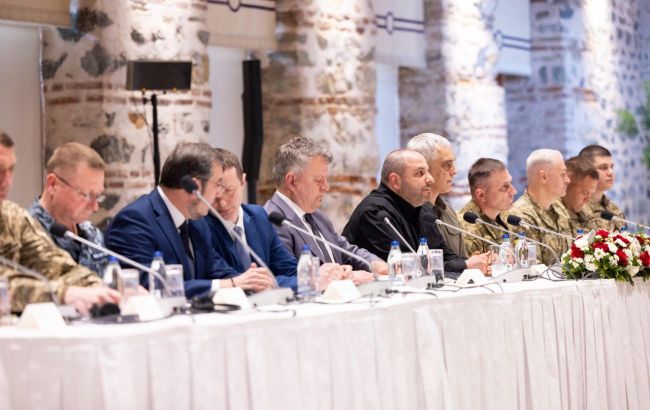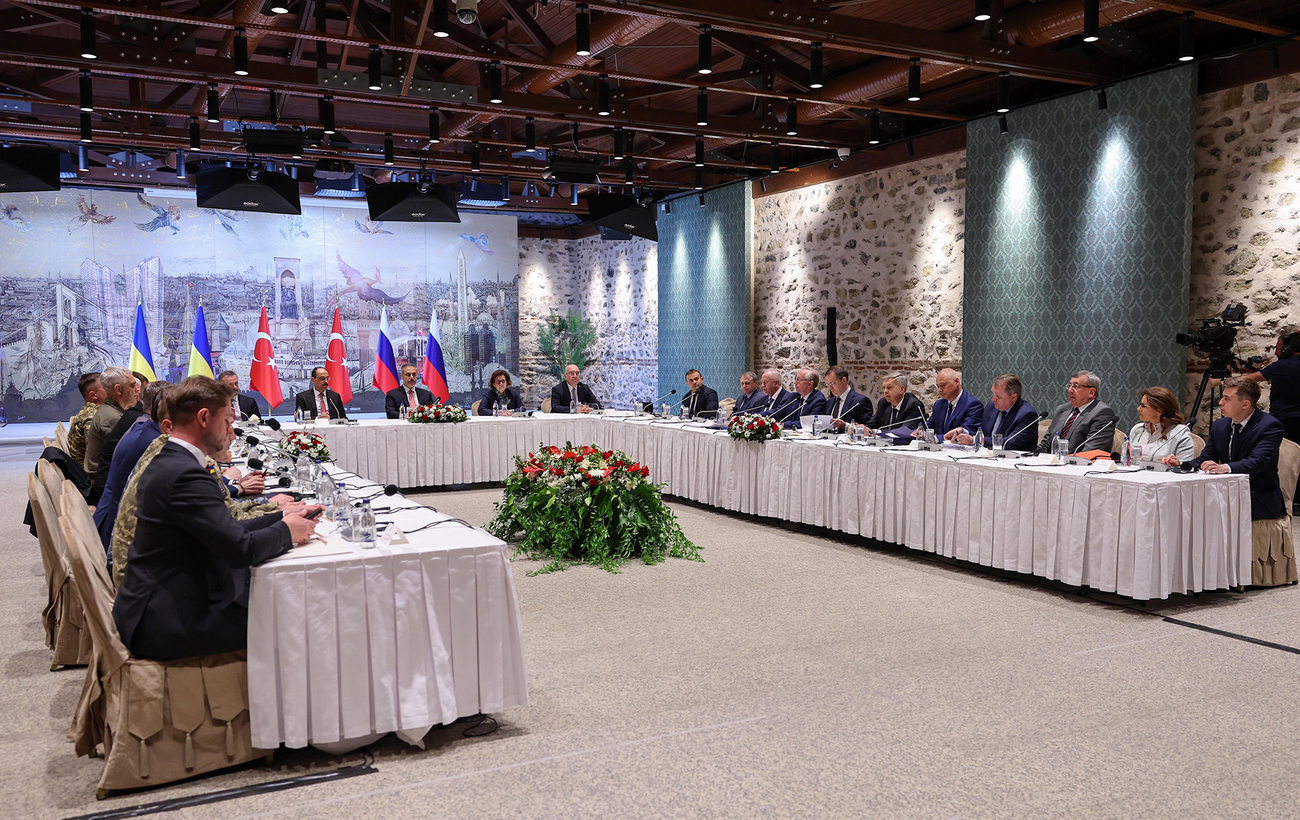All for Trump: Why negotiations in Istanbul didn’t bring war closer to end
 Ukrainian delegation at the negotiations in Istanbul (photo: Getty Images)
Ukrainian delegation at the negotiations in Istanbul (photo: Getty Images)
Read about the results that the negotiations in Istanbul brought for Ukraine, the USA, and Russia in the material by Milan Lelich, Deputy Editor-in-Chief of RBC-Ukraine.
Takeaways
-
What goals did Ukraine and Russia pursue in Istanbul, and were they achieved?
-
Who in Trump’s team understands the real situation?
-
Who holds the key to breaking the negotiation deadlock?
The main outcome of the much-anticipated negotiations in Istanbul was accurately predicted by most analysts even before they began — a complete lack of any result.
Of course, this applies if one considers progress in stopping the war as the desired outcome. As the members of the Ukrainian delegation rightly noted, even if the meeting’s only result is the release of a thousand Ukrainians from Russian captivity — it will be worth it.
Such humanitarian steps had previously been publicly proposed by the Ukrainian side as so-called confidence-building measures. Their purpose is that if the two sides can agree on some non-political concessions to each other, there is a chance they might also reach an agreement on more contentious points.
However, in this case, it might all end with a large-scale prisoner exchange (work on which has only just begun). It could not be otherwise, given that the negotiation participants feel absolutely no trust toward each other and pursue completely different goals.
Russia: Trump’s deception
In recent weeks, Moscow has ceased to be Trump’s undisputed favorite in the Russia-Ukraine war. Yet the aggressors still enjoy obvious favor from the "judge" — a role Trump has appointed for himself.
The Ukrainian authorities not only have to praise Trump’s leading and guiding role in the negotiations every day, but also make real concessions, meet the demands and whims of the American president, and even sign concrete documents such as minerals deal. For the Russians, it’s enough just to vaguely signal a willingness to talk with someone — and Trump responds with enthusiastic excitement.
This time, the Kremlin again did the bare minimum and nothing more: Putin proposed some kind of talks, and a delegation of unclear composition arrived. That seems to be enough for Trump to conclude that "Russia wants peace."
In this sense, the Russian delegation fulfilled the task set for it at the negotiations even before the talks began — simply by appearing in Istanbul. At the same time, they once again demonstrated that they are not prepared to budge even a millimeter from their sky-high demands voiced more than three years ago — the very "demilitarization and denazification."
That’s why Vladimir Medinsky headed the delegation, just as he did in Istanbul in spring 2022. The aggressors openly stated that they regard this meeting as a "continuation" of those talks. And the fact that the realities have completely changed since then, mostly not in Moscow’s favor, does not concern them. On the contrary, judging by numerous leaks from the negotiations, the Russians’ appetite has only grown.
In any case, no significant progress in Istanbul was possible for the simplest reason — Russia does not want to end the war yet. The Kremlin believes it can improve the "facts on the ground" during the summer campaign. Putin’s nighttime proposal for talks is nothing more than a way to escape the ultimatum on a ceasefire set by Ukraine and Europeans — while not appearing in Trump’s eyes as the side "that doesn’t want peace."
And this situation will continue until Trump himself changes his approach.
USA: Trump’s irritation
Many world leaders find it difficult to deal with Trump, not because, for example, he adheres to some established stereotypes or fiercely defends American interests without compromise, but because it’s fundamentally hard to deal with someone who often isn’t sure what they said just yesterday.
How many times have journalists caught him in obvious contradictions, pointed to his own recent statements with opposing messages, only to be met with what seems like genuine surprise from the American leader: Who said that? … Did I say that? … I didn’t say that!
In the story around the negotiations in Istanbul, Trump displayed this trait in full. First, by "forgetting" the promise made to Europe and Ukraine to impose sanctions on Russia if it refused a ceasefire. Then, by demonstrating his skill in describing any geopolitical situation with a set of five words: Putin didn’t come to Istanbul because I didn’t come; and I didn’t come because Putin didn’t; I could have come, but I didn’t.
It was clear that during these days, the US president was visibly irritated by questions about the Russia-Ukraine issue — as he was on a Middle East tour signing multibillion-dollar deals with people who promised to give him an entire airplane. Trump simply brushed off such minor details as the weak composition of the Russian delegation at the negotiations, stating that nothing will happen until he personally talks to Putin. But, as we know, "he didn’t come."

Negotiations in Istanbul (photo: Getty Images)
At the same time, some members of Trump’s team fully understand the situation. At least, Secretary of State Marco Rubio, one of the few "adults in the room." In conversations with journalists, he repeatedly — and voluntarily — highlighted the low level of the Russian delegation. He even openly admitted that he expected nothing from the Istanbul negotiations.
However, Rubio’s ability to influence the situation is very limited. In the authoritarian culture of power built by Trump, being smarter than the boss is a serious offense, and the ambitious Secretary of State understands this well.
Therefore, although Volodymyr Zelenskyy, along with leaders of major European countries, continues to call Trump and explain the real state of affairs, it doesn’t yet seem to have much impact on the American leader’s position. Perhaps the situation will change after a reportedly planned call from Putin to Trump. But it’s frightening to imagine in which direction.
Ukraine: Struggle for Trump
Under the difficult circumstances, the Ukrainian delegation likely squeezed out the maximum possible. In response to Trump’s call, Zelenskyy personally came to the negotiations, bringing not third-tier deputies but the top leadership of the country. Trump was given no reason to accuse Kyiv of "ingratitude" or "unwillingness to end the war."
On the contrary, in a face-to-face confrontation with the aggressors, Ukraine made it clear that it has no intention of retreating without a fight, even on minor details. If the Russian delegation was headed by Medinsky, symbolizing the desire to continue the discussions from "that" Istanbul, Ukraine’s delegation was led by Defense Minister Rustem Umerov, alongside many top military officials.
By this, Ukraine demonstrated that it will not back down from its main demand: first — a ceasefire (for which military involvement is precisely necessary), and only then can debates on other topics take place.
In the end, besides agreeing on a 1,000-for-1,000 prisoner exchange, both sides agreed to exchange their mutual vision of a ceasefire. The chances of anything coming of this are very slim if the aggressors insist on the withdrawal of the Ukrainian Armed Forces from four regions — a demand that is a priori impossible.
A way out of the current status quo is only possible through the efforts of Trump, who holds that same "nuclear button" of secondary sanctions. So, as RBC-Ukraine wrote, the struggle for the American president’s favor will continue.

